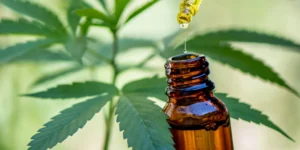In a new study the administration of the marijuana compound cannabidiol (CBD) “decreased daytime drowsiness and was associated with a lower prevalence of low testosterone levels in older men as compared to age-adjusted population norms.”
 “Previous research indicated that cannabidiol (CBD) may result in low levels of male total testosterone (TT), elevations in liver tests (LTs), and daytime drowsiness (DD)”, states the study’s abstract. “We investigated the prevalences of TT and LT in a large adult sample self-administering CBD and determined the effect self-dosing of CBD has on the severity of DD.”
“Previous research indicated that cannabidiol (CBD) may result in low levels of male total testosterone (TT), elevations in liver tests (LTs), and daytime drowsiness (DD)”, states the study’s abstract. “We investigated the prevalences of TT and LT in a large adult sample self-administering CBD and determined the effect self-dosing of CBD has on the severity of DD.”
Published in the peer-reviewed journal Medical Cannabis and Cannabinoids and epublished by the U.S. National Library of Medicine, the study was conducted by researchers at Tarleton State University (Texas), the University of Chicago (Illinois), Syzygy Research Solutions (Florida) and the Midwest Allergy Sinus Asthma PC (Illinois).
For the study adult participants (18-75 years of age) who self-dose CBD orally for a minimum of 30 days were recruited for this decentralized observational study from companies that offer CBD products. Participants were sent their usual CBD regimen. A clinical study platform was used on a phone app to obtain consent and collect study data.
“Data included demographic information, reasons for self-dosing, dosage, current medications and dosage, medical history, adverse effects, effects on DD, and efficacy”, notes the study. “After 30 days, LT and TT were obtained and follow-up LT was offered to participants who demonstrated elevated values of alanine transaminase (ALT).”
A total of 28,121 individuals were contacted, 1,475 met the criteria and were enrolled, and 1,061 (female: 65.2%, male: 34.8%) completed the study. Most of the participants used full-spectrum CBD oil or CBD isolate with the mean ± SD daily dose of CBD for all users of 55.4 ± 37.8 mg.
“CBD use was associated with a significant decrease in DD and a decrease in the prevalence of low TT in males >40 years of age”, states the study’s researchers. “The prevalences of elevations in ALT and aspartate aminotransferase were not significantly different from those of the general adult population, and the prevalences of elevated levels of alkaline phosphatase and bilirubin were less than those of a healthy adult population. There was no relationship between LT and CBD dose.
The study concludes: In this large-sample study, self-dosing CBD was not associated with an increased prevalence of elevation of LT or low levels of TT in men. Furthermore, CBD administration decreased DD and was associated with a lower prevalence of low testosterone levels in older men as compared to age-adjusted population norms.”






